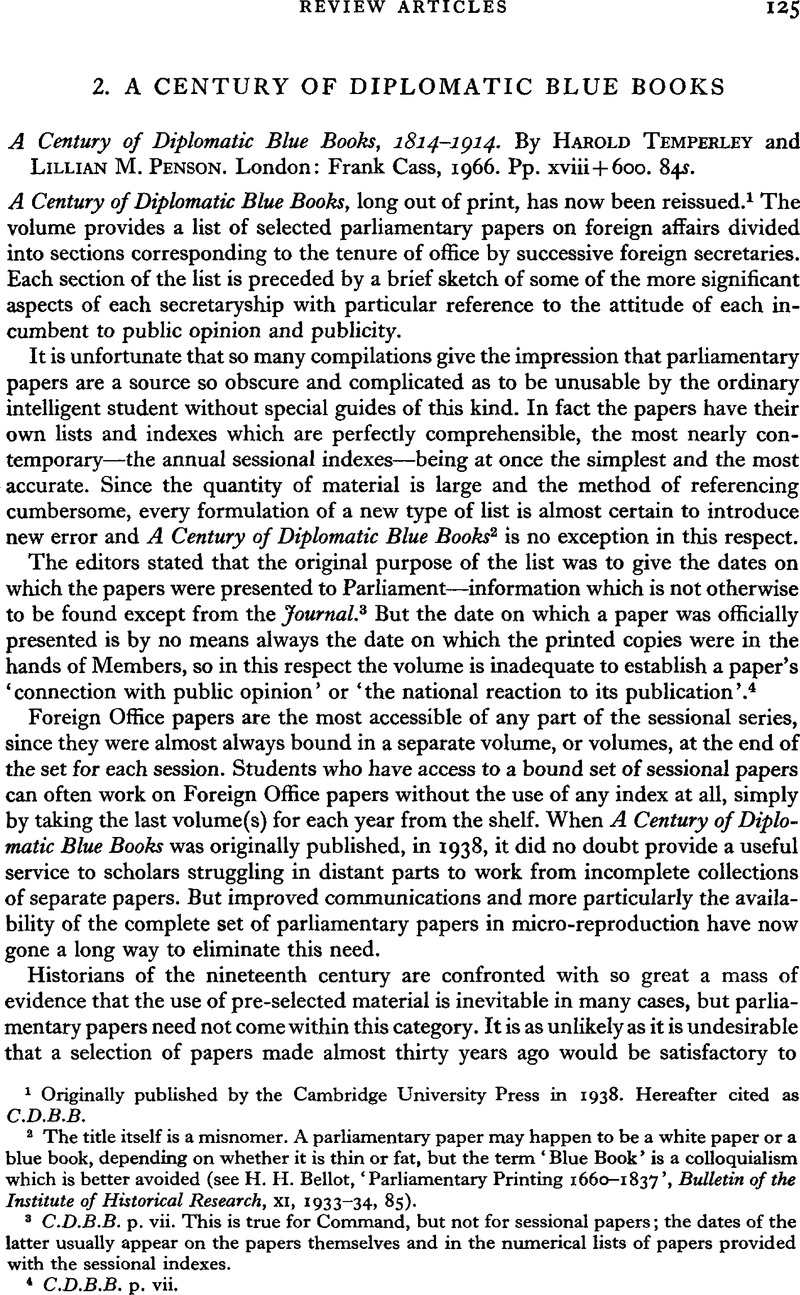Article contents
2. A Century of Diplomatic Blue Books
Published online by Cambridge University Press: 09 December 2010
Abstract

- Type
- Review Articles
- Information
- Copyright
- Copyright © Cambridge University Press 1967
References
1 Originally published by the Cambridge University Press in 1938. Hereafter cited as C.D.B.B.
2 The title itself is a misnomer. A parliamentary paper may happen to be a white paper or a blue book, depending on whether it is thin or fat, but the term ‘Blue Book’ is a colloquialism which is better avoided (see Bellot, H. H., ‘Parliamentary Printing 1660-1837’, Bulletin of the Institute of Historical Research, XI, 1933-1934, 85)CrossRefGoogle Scholar.
3 C.D.B.B. p. vii. This is true for Command, but not for sessional papers; the dates of the latter usually appear on the papers themselves and in the numerical lists of papers provided with the sessional indexes.
4 C.D.B.B. p. vii.
5 C.D.B.B. p. xv.
6 If the terms of a treaty ‘involve the imposition of any charge on the subject or an alteration in the rules of English law, they cannot take effect without the sanction of Parliament’ (Holdsworth, W. S., ‘The Treaty-making power of the Crown’, Law Quarterly Review, LVIII, 1942, 175–83)Google Scholar.
7 In 1791 Dundas maintained that he need not give papers concerning the Ochakov crisis since what was proposed was not a war but ‘an armed negociation’, but he admitted that ‘when a war was resolved upon, and ministers came to the House of Commons for support, they should have the reasons that induced the king's ministers to go to war, laid before them’ (Parliamentary History, xxix, 215-16).
8 C.D.B.B. p. xii.
9 Part. Hist, XXX, 143.
9 Parliamentary Debates, X, 125-6.
10 Ibid., pp. 755-60.
12 See the Speaker's ruling on the subject, in 1806 (ibid, VI, 521).
13 Thirty-two of the debates occurred between 1859 and 1866.
14 C.D.B.B. pp. ix, xv.
15 The sketch of Canning's policy in C.D.B.B. is a reprint of an article which originally appeared in the Cambridge Historical Journal, 1 (1924), 164–9Google Scholar.
16 Ibid, VI (1938), 1-32.
17 Ibid. p. 3.
18 It is not quite clear which papers are meant. The number seventeen can be made up if no. 95 is excluded as being originally a House of Lords Address, and nos. 112a and b are included, though these addresses were moved after April 1822.
19 I assume that C.D.B.B. no. 119, is meant; this was printed as a Command paper, by the Gazette printer.
20 C.D.B.B. p. xv.
21 The reason for this was the disputes between the rival printers.
22 H.C. (544) of 1823; (29s) of 1824; (166) of 1825; and so on. The note in C.D.B.B. p. 38, suggests that the omission of these papers was intentional.
- 2
- Cited by


